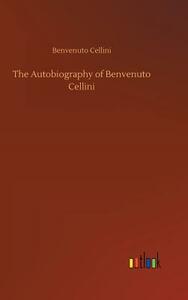Take a photo of a barcode or cover
adventurous
Excellent Audio Book
This review is for the audiobook version of this fantastic autobiography. Cellini is incredibly arrogant, but his story is entertaining and gives a fascinating look at the Renaissance and many of its major characters. Even though he is not the most likable man in the world, there are many things to admire about his strength of character. It is easy to see why he had so many enemies, though I'm not sure he understood why. His descriptions of the courts of Italy, France, and the Church give us priceless information on how they functioned. Historians like Durant referenced this work a lot in their histories. It also affirms to me that human nature has always been the same.
The reader of this audiobook is Robert Whitfield, whose characterization is what I imagine for Cellini. He had that touch of arrogance in his voice one would expect from a significant braggart, but it was not too grating and easy to listen to. The translation by John Addington Symonds was also excellent and very easy for a modern ear to understand.
I highly recommend this audiobook to anyone that loves a good story. It has action, adventure, romance, intrigue, and about anything else one would look for in a good book. The audiobook is 15 ½ hours long, and the time went by quickly.
I originally wrote this review on 7/2/2008.
A fascinating insight into the mind of an artist in Renaissance Italy. I’m definitely taking the accuracy of the account with a hefty dose of salt - it seems many of the anecdotes serve to bolster his reputation and fame for posterity, but nevertheless it provides much insight into what a man of the 1500s would deem valuable to be remembered for. Connections to major names of the day from popes to Medicis to Michelangelo, recommendations of his quality across many arts, witty advertisement of his skills and speeches to his patrons, feats of arms, presence at historic events, and making his image as a singular talent all feature through his life’s story.
Cellini does seem to particularly flourish on tearing others down to bolster the view of his own work, and perhaps on finding ways to make himself enemies. It feeds into a world he presents with every nobleman and artist seeking the best for themselves - the most money and possessions gained for promises, constant deferral of payments and pushing back of timelines, perpetual questioning of reputation and backstabbing. As this resulted in his repeated imprisonment and even more fears of arrest, this strategy of pushing upwards by driving other artists, courtiers, and even patrons down was clearly one with mixed results.
I found the particular translation I picked up - translated by John Addington, read by Simon Vance - overall satisfying. The language chosen fit well with the mood and ego behind the writing. The writing itself is largely readable and enjoyable once the accustomed to the self-aggrandizing and embellishment, though it does suddenly jump between episodes. This is an element I’m fairly familiar with from other medieval and Renaissance works (such as various works on chivalry, e.g. Lull, and the Book of Margery Kemp), but is still jarring compared to modern biographies to the 21st century reader.
Cellini does seem to particularly flourish on tearing others down to bolster the view of his own work, and perhaps on finding ways to make himself enemies. It feeds into a world he presents with every nobleman and artist seeking the best for themselves - the most money and possessions gained for promises, constant deferral of payments and pushing back of timelines, perpetual questioning of reputation and backstabbing. As this resulted in his repeated imprisonment and even more fears of arrest, this strategy of pushing upwards by driving other artists, courtiers, and even patrons down was clearly one with mixed results.
I found the particular translation I picked up - translated by John Addington, read by Simon Vance - overall satisfying. The language chosen fit well with the mood and ego behind the writing. The writing itself is largely readable and enjoyable once the accustomed to the self-aggrandizing and embellishment, though it does suddenly jump between episodes. This is an element I’m fairly familiar with from other medieval and Renaissance works (such as various works on chivalry, e.g. Lull, and the Book of Margery Kemp), but is still jarring compared to modern biographies to the 21st century reader.
Great read. Benvenuto led a very interesting life and wrote a very interesting account. The writing is largely benefitted by the significant embellishments made it certain areas. Overall it is a great look into the mind of a gifted artist and the political life of 16th Century Italy and France.
If you want people to be reading your autobiography almost more than five hundred years later, write as entertaining a book as this one. A treasure.
informative
lighthearted
reflective
slow-paced
Minor: Physical abuse, Suicidal thoughts, Violence, Sexual harassment
Besides being written by quite a character and full of adventure this book is good reading for any kind of artist who has to deal with patrons or people who owe them money. Artists have been getting screwed for centuries.
Necromancy, assassinations, prison breaks, poisonings, stabbings (so many stabbings!), pranks on Michelangelo… dude lived a life. Come for the adventure, stay for the fascinating glimpse into Renaissance life and art. I read because Bujold based part of The Spirit Ring on Cellini and said fact was stranger than fiction… she was not wrong.


